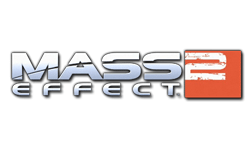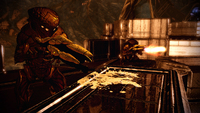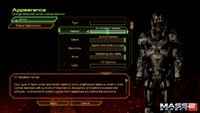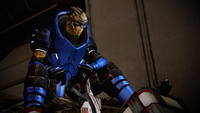|
|

|
PLATFORM
|
Xbox 360
|
BATTLE SYSTEM
|

|
INTERACTION
|

|
ORIGINALITY
|

|
STORY
|

|
MUSIC & SOUND
|

|
VISUALS
|

|
CHALLENGE
|
Adjustable
|
COMPLETION TIME
|
20-40 Hours
|
|
OVERALL

|
+ Terrific, fast-paced combat.
+ Great story and characters.
+ Amazing cinematic style.
- Thermal clips are a step backwards.
- RPG elements feel stripped down.
- Some visual bugs.
|
Click here for scoring definitions
|
|
|
Mass Effect: a delicious concoction of nearly every over-used sci-fi concept ever imagined blended together in such a way to create a wholly unique universe, and a game that's easily stolen several weeks of my life over the past two years. Despite its flaws, it was a game that stuck with you in a way that many "better" games don't. Fast-forward two years, and the highly-anticipated second part of the trilogy, Mass Effect 2, has finally reached its audience. And the wait was worth it.
Mass Effect 2 takes place two years after Commander Shepard defeated Saren and the reaper Sovereign. This time around, human colonies in the outlying systems of the galaxy are being abducted one by one, and Shepard finds himself allied with the shadowy Cerberus organization, led by a cigarette-smoking figure known only as the Illusive Man.
Although the game begins with a strictly linear series of events for the first few hours, Mass Effect 2 opens up into a much more non-linear experience than the original game provided. Rather than three locations to investigate, the Illusive Man provides Shepard with dossiers on highly-trained specialists to recruit for an elite fighting force. Instead of going right to the source of the threat, the majority of the game is spent recruiting these characters in mission-based gameplay that takes you across the galaxy. Furthermore, each character has some element of their past that needs to be cleared up before they become completely loyal, and these loyalty quests are as numerous and lengthy as the initial recruitment, providing another huge chunk of entirely optional gameplay (although players will want to complete these if they hope to see the best endings the game has to offer.) Past the initial set-up missions, there are only four actual plot-driving missions to complete, each of which is triggered once a certain number of optional missions have been finished up.
This layout is a huge improvement over the original game. Not only do you have significantly more freedom in where to go and when, but it also makes the game more than twice as long. The drawback, unfortunately, is that the plot of the game is thinner than the original. While it is still solid and enjoyable, there is less of it than there was in Mass Effect, the majority of the game being spent on character development. The game is also much more cinematic in its presentation than its predecessor. Characters move their arms and heads more during speech, and many cutscenes actually involve significant motions such as leaning on a railing or even throwing a punch. Considering how cinematic Mass Effect was, the improvements made in Mass Effect 2 just seem that much more phenomenal. It's hard to imagine them becoming much better in Mass Effect 3.
 A formidable new foe.
A formidable new foe.
|
|
Like the original game, the story sequences are fully interactive, with the player selecting dialogue for Shepard from the "dialogue wheel." In addition to the paragon and renegade choices seen in the original game, Shepard can also occasionally perform special paragon and renegade actions by pressing a specific button when prompted during scenes. These actions can provide all manner of benefits. Performing a paragon action when speaking to an injured person might heal him, making him trust Shepard all the more. Similarly, performing a renegade action when facing down a powerful opponent might provide an advantage in combat. Some actions just provide a bit of extra entertainment. Regardless, this feature provides for a much richer experience, and there is always plenty of time to hit the button; fast reflexes are not required here.
The improvements to combat are numerous as well. Like Mass Effect, Mass Effect 2's combat system is based on tactical third-person shooters like Uncharted. Shepard leads a group of three into combat, and while Mass Effect provided many assists to make the game more like an RPG, Mass Effect 2 embraces the shooter genre, making it much more skill-based than its predecessor. You'll deal more damage shooting an enemy in the head than in the chest, and shooting some enemies in the leg or arm can disarm or cripple them, providing more benefits.
Even the cover system has been improved. It's now controlled by a button press, making it much less finicky when entering and leaving cover. The game's six character classes have also been revamped, reducing the total number of skills each has, introducing class-specific special abilities, and making each generally more unique. Ally characters no longer constrain to typical class designations, and some show rather unusual skill and weapon-sets. Even though there are eleven ally characters in the game (counting Zaeed, a character only available through downloadable content), each one is completely unique and brings something different to the party.
The one pitfall that the improved combat brings with it is the introduction of "thermal clips." In the original Mass Effect, weapons did not use ammunition. Instead, continued use of a weapon would cause it to overheat. Once it reached a certain threshold, it would be unusable until it cooled down. This provided for an interesting dynamic, where players were encouraged to use burst-fire tactics, ducking behind cover after a few bursts to let the weapon cool down. It worked wonderfully with the cover system and was unquestionably the most unique and well-implemented idea in the original title.
Thermal clips, on the other hand, are poorly implemented, poorly integrated into the story, and are nothing different from the ammo systems seen in typical shooting games. Firstly, the maximum number of rounds most guns are able to hold are pathetically small. The basic sniper rifle can only hold ten rounds total and needs to be reloaded after every shot. The "upgraded" version of the heavy pistol only holds twenty-four rounds, with a six-shot clip. Needless to say, these guns run out of ammo quickly. Even the upgraded assault rifle can only hold about a hundred rounds, which are easily depleted in an automatic weapon. While thermal clips are dropped regularly by enemies, picking them up in mid-combat runs counter-intuitive to the design of the cover system, which encourages you to hold your ground whenever possible. Running across a battlefield to collect ammo is often a suicidal idea. What ends up happening is an easter-egg hunt post-battle, where you run around the map searching for ammunition, which breaks the flow of the game and is a downright nuisance.
 Armor can be customized in many ways.
Armor can be customized in many ways.
|
|
The experience and equipment systems have been changed a great deal as well, and this is going to be the point of contention for a lot of players. Rather than gaining experience for killing enemies as in most RPGs, experience is only awarded when a mission or quest is completed. Although players have a lot of freedom in terms of story, when it comes to developing their character, Mass Effect 2 is tightly controlled. Each major mission provides exactly enough experience to grant a single level, and loyalty missions provide exactly three quarters of a level. Small sidequests provide either fifty or one hundred experience apiece, and this consists of the entirety of the experience-granting sections of the game. The result is that you only get to level up when BioWare decides to let you. Credits, the game's currency, suffers the same problem. They are no longer earned by killing enemies, and only a limited amount exists within the game.
Luckily, when it comes to assigning skill points, you have much more freedom. By the time you reach level thirty, you'll have enough points to max out all but two of your skills. You can also train to use an additional skill of your choice by completing loyalty quests, providing another element of customization. This provides plenty of options for each character, and since there are multiple strategies for playing each class, players will probably find themselves with very different builds based on what they like to do.
The equipment system from the original Mass Effect has been scrapped altogether. Instead, there are only two of each type of weapon (three for classes that specialize in a particular type) in the entire game, which are discovered in fixed locations. Likewise, rather than finding new armor regularly, a limited number of fixed-stat armor pieces can be purchased from vendors and mish-mashed together to create your armor set. Players who value aesthetic design (and lets face it, that's all of us) will be happy to know that you can customize the color, material, and patterns of the armor, regardless of which pieces you use. Ally characters do not have armor to customize at all, although you can unlock an additional color-scheme for each.
You will also find or purchase permanent weapon, tech, biotic, and defensive upgrades in fixed locations as well. While the ones you purchased are researched immediately, the found ones require the investment of materials which are discovered through a simple yet surprisingly addictive planet-scanning mini-game. The mini-game is slow and tedious at first, but after receiving an upgrade from Miranda, it's much more enjoyable. The result of all of these elements is that the game feels much less like an RPG than Mass Effect did. For those that already felt that Mass Effect wasn't enough of an RPG, Mass Effect 2 is just going to make things worse.
 Garrus is one of many familiar faces you'll run into.
Garrus is one of many familiar faces you'll run into.
|
|
Mass Effect 2's visuals are another step up for the developer. The textures are more detailed, the animations more complex and fluid, and the environments more impressive. The lengthy loading times are still around, but they are generally less frequent, which evens things out a bit. Unfortunately, the game also has its share of bugs, most of them visual in nature. In particular, players may notice that character models suddenly disappear during cutscenes. This happened to me several times, and while it has only ever affected dialogue sequences, it is nonetheless a bit disconcerting to watch Shepard headbutt an invisible krogan. Also, the hairstyles still look like plastic wigs, but this may explain why most of the human characters in Mass Effect 2 sport buzz cuts, even the women.
Like the original, Mass Effect 2's score is appropriately epic in nature, and really shines during the major event scenes throughout the game. Most pieces sound like they've been pulled right out of the latest science fiction movie, and it really amplifies the excitement. The voice acting is once again superb, and like the original game, every line is fully voiced.
Once everything is said and done, most players can expect to have spent between thirty and forty hours completing Mass Effect 2, a substantial improvement from the extremely short original. Mass Effect 2 does sport a new game plus mode, but surprisingly it's actually fairly pointless to start one. You only keep the weapons that are found in fixed locations, but lose the upgrades you likely spent a lot of time collecting. In addition, your level is likely to be close enough to the maximum that you'll reach the cap after only four or five missions. The best bonuses — 25% additional experience and 200,000 starting credits — are actually triggered by an achievement rather than the save data, which means brand new characters gain the same benefit. It's actually better (and more fun) to start from scratch than to start a new game with your first character. Although technically not its new game plus mode, it ends up being better in the end.
Mass Effect 2 is a strange game that is going to create something of a rift between fans of the original. Many people, like myself, may find themselves disappointed at the stripping of many of the RPG elements from the original game, while others may find that embracing the shooter gameplay is a step in the right direction. Regardless, it isn't fair to judge Mass Effect 2 on what it isn't, when what it is is a fantastic game. Like the first game, there are a few nagging issues, but by and large, it is a significant improvement over the original. And no matter how divisive the gameplay may be, the story is everything Mass Effect fans have come to expect. Whether BioWare tries to find a middle-ground with the next installment, or steps even further into shooter territory, Mass Effect 3 is a game we can all look forward to.
Review Archives
|









